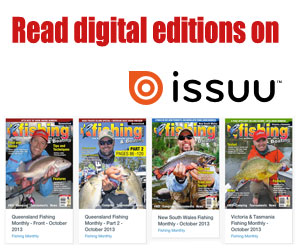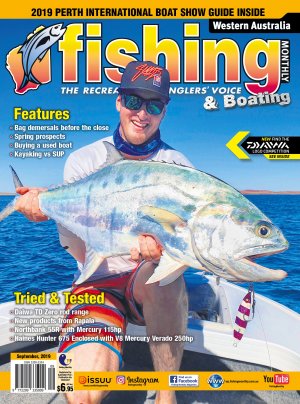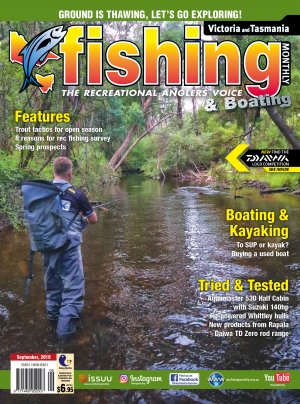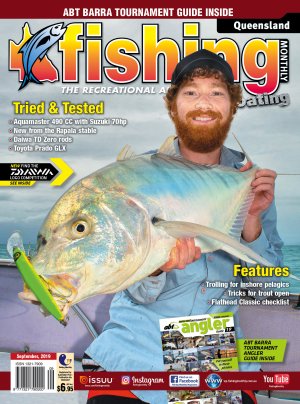Winter has arrived in Canberra and we have had some early season snowfalls, some of them quite heavy. Predictably, the fish have responded in different ways, depending on their country of origin and thus their temperature tolerance.
Murray cod generally have gone deep, sitting quietly in their preferred thermocline and eating only occasionally. They can be caught, but more effort than usual is required, Occasionally one will take a lure such as a spinnerbait or deep diver as long as it passes right under its nose but it may also just ignore it. Some will respond to a fat bardi grub leaking berley into the water or a small live yabby or shrimp. Scrub worms also can be effective.
Golden perch react in generally the same way, but are perhaps a bit more active than cod during cold weather. They respond best to scrub worms, live yabbies or shrimps dropped alongside a flooded tree or steep rock face.
Redfin, especially the small ones, also have gone quiet. A few larger fish will feed throughout the winter and will take lures and baits but it will take a lot of searching to find them.
Trout of course are in their element in winter. The streams are closed until the October long weekend to enable the fish to spawn in peace and at the moment many of the browns are on their way upstream to favoured spawning grounds in the Eucumbene, Thredbo and other rivers. The rainbows will follow in August and September.
The lakes of course stay open all the year round and fishing has been excellent, with plenty of rainbows off the bank on Power Bait, scrub worms and bardi grubs. This will continue right through winter and fishing can be very rewarding in even the coldest weather as long as you are suitably garbed and prepared for it.
As a good example of winter preparedness you can always pick the visitors to Canberra in wintertime. They dress excessively heavily, with bulky coats, overcoats, sweaters, jackets, gloves, scarves, headgear and other paraphernalia predominant. That's because they think it is cold, when it really is not all that bad.
Locals of course dress much more moderately, partly because they live in air-conditioned houses, drive air-conditioned cars and work in air-conditioned offices, but also because they have become accustomed to cold weather. Outdoor workers similarly dress with minimal, but thermally effectively, warm clothing. Quality, not bulk, is the answer to staying warm and comfortable.
Visitors also forget to put anti-freeze in their car radiator. That's why you see them standing alongside a stopped vehicle on the roadside in the early morning, steam gushing from a burst radiator hose and the engine block still frozen solid.
Of course Canberra is cold in winter, but not really as cold as many people imagine. We might get down to minus 5 degrees Centigrade overnight but the ice often disappears quickly during the day and the temperature often gets up to 10 or 11 degrees by lunchtime. Bracing perhaps, but not a calamity.
I mention all of this because in much of Australia people have dreadful misapprehensions about weather, especially cold weather. I watch them coming through Canberra on the way to mountain fishing regions, especially Tantangara, Eucumbene and Jindabyne, where the weather really does get cold in winter and I worry about their preparedness for temperatures as low perhaps as minus 18 degrees and where they might experience wind chill factors that equate to minus 35 degrees centigrade.
Firstly, many of them are wearing the wrong clothing. What you need is thermal insulation with as little bulk as possible. Put good quality thermal gear close to the skin and it will work wonders in temperature control. Put waterproof gear over that where required, to keep rain, sleet or melting snow at bay. A general type of coverall, too, will help in keeping clean. Full-length waders are effective and so too are the disposable paper suits that can be tossed into the fire when you finish a trip.
Keeping feet warm is essential. Use good thermal socks where possible and make sure your waders are of a size big enough to accommodate them. Neoprene waders are far more effective in staying warm than vinyl, plastic or other types. They are more expensive, but well worth the money.
Don’t neglect the head and face either, because this can account for up to 38% of all heat lost from the body. A good balaclava and a thick beanie usually does the job, but hats and caps are mostly useless.
Pocket warmers, especially the solid-fuel types, are excellent. One common strategy is to place one in a breast pocket and one in a right hand trouser leg pocket, working on the basis that circulating blood has to go past one of them sooner or later. Alternatively you can drop a couple down inside your waders but be careful. I know of one fellow who lit and crammed two solid fuel sticks instead of the usual one into the holder, dropped them into his waders and fell asleep. He woke up an hour later sweating like a pig and with a badly blistered backside.
There are lots of other things visitors should be aware of. Firewood these days is almost non-existent at the mountain lakes; it has all been used up. That means you take your own and you will need plenty, usually far more than you think. One of the simplest solutions is to buy bagged wood from a service station. All of them in this region sell it.
An alternative is to use portable gas appliances that serve as cooking and heating units. Camping stores carry a wide variety of them and the prices are relatively modest. They have the advantage of portability and ease of use but ensure that you get the right gas mixture. Some gas containers freeze up at low temperatures and the gas won't come out.
Make sure you have good Eskies or cool boxes, too. They have a dual role of stopping food from spoiling but also stopping food from freezing when you don't want it to. There's nothing worse than pulling a roast chook out of the pack to have for lunch and finding it frozen solid. Put it in the Esky where it will stay fresh but ready to eat.
Vehicles, too, need a lot of attention. Firstly, you will need antifreeze in the radiator to stop your engine from freezing. Secondly, don’t let snow or rain get into your door locks otherwise you won't get the key in it until you piddle on it to melt and remove the blockage. Similarly, some people prefer to leave the handbrake off to avoid the brake shoes freezing onto the drums in wet weather. Simply leave the car parked in gear.
Chains also are useful. They are mandatory in many mountain areas during winter unless you have 4WD and are essential to accessing some areas.
Remember also that many areas lack mobile phone coverage, so it pays to let someone know exactly where you plan to head on a trip and exactly when you expect to arrive home. If somebody has to come and rescue you for some reason it makes it a whole lot easier and faster if they know exactly or even approximately where you are. Carrying one of the new 406 frequency EPIRBS also is a sensible move. If you get into trouble you can activate it and help should not be far away.
Boating in wintertime has an attendant high risk. Have a think about it before you go and remember a couple of commonsense cautions. Remember if you fall overboard you survival time is just a couple of minutes. If you fall out of a boat, get back in and get back to shore for warmth and dry clothes immediately. Of course, it pays not to fall in. You can minimise your chances by not leaning over the side to have a leak or net a fish. Don't stand up unless you really have to. Move around the boat with care.
Then above all, keep the grog intake to a minimum. Alcohol may give an initial feeling of warmth, but actually reduces body temperature soon after. Further, it dulls your brain at a time when you need heightened sensibility because of the very real dangers inherent in cold weather. Put safety and commonsense ahead of grog and you will not only enjoy your fishing trip but survive for the next one.
shrimps.
Reads: 7021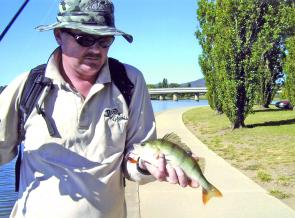
Smaller redfin that are around in plague proportions in summer disappear during winter but larger specimens commonly stay active.
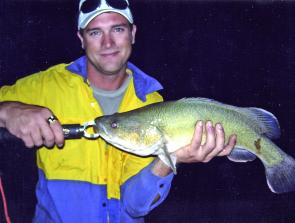
Murray cod can be tempted during cold weather occasionally on lures but more commonly on bardi grubs, yabbies or
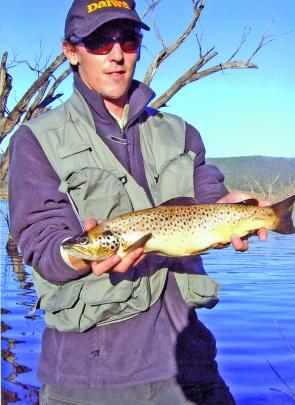
Trout are in their element during cold weather and can be taken on bardi grubs, scrub worms and Power Bait before and after their winter spawning runs.

